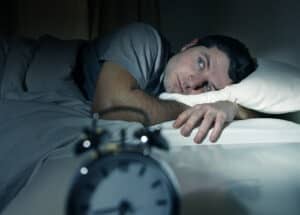About 15 million people in the U.S. work evening shifts, rotating shifts, or irregular schedules. Certain industries, such as health care, aviation, hospitality, and public safety, are more likely to employ people that work long hours or work in shifts. Shift work can include rotating shifts, evening shifts, or night shifts.
Shift work calls upon employees to work a shift that falls partially or fully outside of a 7 a.m to 6 p.m. schedule. Some people may work early morning or late night shifts, while others may work rotating shifts, where their hourly shift blocks continuously change with other workers.
When a work schedule keeps someone from sleeping during nighttime hours or getting enough sleep, it can lead to fatigue and changes to the body’s natural sleep-wake cycle. While some people can adapt to irregular work schedules, others may experience sleep disturbances or even develop a condition called shift work sleep disorder.
Find out how shift work impacts sleep health and steps that shift workers can take to improve their sleep.
Top 5 Tips for Shift Workers

- 1 Schedule – and sometimes sacrifice – social obligations so that you have enough time for sleep.
- 2 Talk to your supervisor and avoid operating machinery if you feel tired.
- 3 Use light to adjust your body clock and maintain alertness.
- 4 Drink caffeine early in your shift and then avoid it later on.
- 5 If your schedule allows, short naps right before a shift or in the middle can decrease fatigue and increase focus.
Talk with your doctor about sleep issues if these changes are not helping with symptoms of sleepiness.
What Is Shift Work Sleep Disorder?
Shift work sleep disorder, also known as shift work disorder, is a mismatch between the body’s circadian rhythms and a person’s work schedule that causes sleep loss. Shift work sleep disorder is a type of circadian rhythm sleep disorder that affects at least a third of shift workers.
There are a variety of work schedules, but some shifts require people to wake and sleep at times that conflict with natural cues in the environment that encourage sleep and wakefulness. Shift work sleep disorder is common amongst rotating, night, and early morning shift workers.
Typically, people with shift work sleep disorder have ongoing insomnia or excessive sleepiness because their work hours prevent them from sleeping during the conventional time for sleep.
How Shift Work Affects Your Circadian Rhythm
Working in shifts can disrupt the sleep-wake cycle, one of the body’s circadian rhythms. Circadian rhythms are internal 24-hour biological patterns that regulate many processes in the body, including sleep. A person’s level of alertness and sleepiness across a 24-hour period is determined by their sleep-wake cycle and heavily influenced by light exposure.
Nighttime shift workers are awake and exposed to light at night and often sleep during the day. However, this goes against the body’s natural sleep-wake cycle. Because the body wants to be alert when it is light outside, night workers may experience short or disrupted sleep during the day. In addition, they may be tired at night at their job because the drive to stay alert is reduced.
As shift workers maintain a schedule of unusual shift hours, eventually sleep debt can occur. As a person’s sleep debt increases, brain and body functioning can deteriorate. As workers continue to work continuous shifts or long hours, they may develop poor work performance and even be at a higher risk for accidents.
Symptoms of Shift Work Sleep Disorder
The main symptoms of shift work sleep disorder are excessive sleepiness when awake and difficulties getting to sleep. Other common symptoms of shift work sleep disorder include:
- Fragmented or shortened sleep
- Fatigue and exhaustion
- Poor decision-making and performance
- Headaches
- Body aches and pains
- Mood changes
- Reduced alertness
- Having a desire to nap at work
- Social avoidance at work
How severe a person’s symptoms are might depend on how often and how dramatically their shift changes, the number of consecutive shifts they work, and how many nights or early morning shifts they work. Interestingly, working early shifts that start between 4 a.m. and 7 a.m. can also cause symptoms of shift work disorder.
Risks of Shift Work Sleep Disorder
The impaired performance and functioning associated with shift work sleep disorder pose serious health, social, and safety concerns for workers.
- Health problems: Shift work is associated with an increased risk for heart disease, weight gain, cancer, and problems in pregnancy. Studies have also linked shift work to depression, anxiety, and problems with memory.
- Drug dependency: People who work shift schedules and experience sleep problems may use or become dependent on drugs and alcohol in an effort to help improve their sleep disturbances.
- Vehicle accidents: Shift work can lead to drowsy driving and increase the risk of having a car accident while driving to and from work.
- Workplace accidents: The sleepiness that accompanies shift work sleep disorder reduces alertness and functioning and can cause an increase in workplace mistakes and accidents.
- Social problems: People with shift work disorder report social impairments, such as social isolation and irritation.

How Is Shift Work Sleep Disorder Diagnosed?
Shift work sleep disorder is diagnosed by a doctor using a specific set of tests and questionnaires including a sleep history, sleep diary, and a test called actigraphy.
During a sleep history for shift work disorder, a health care provider collects information about a person’s history of shift work, their symptoms, and their sleep habits.
In addition, health care providers typically ask people to complete several questionnaires and a sleep diary. A sleep diary provides information about a person’s sleep and wake patterns across a set period, usually a few weeks.
For people who have difficulty keeping a sleep diary, their health care providers may recommend actigraphy. Actigraphy uses a wrist-worn device, similar to a watch, to measure a person’s sleep-wake cycles.
Information from a sleep history, sleep diary, and actigraphy are used to determine if a person meets the criteria for shift work sleep disorder including:
- Insomnia
- Sleep loss
- Excessive daytime sleepiness
- Symptoms lasting three months or more
- Impaired daytime function
As part of the diagnostic process, health care providers also rule out any other conditions that could be causing these symptoms.
Sleep studies are rarely used to diagnose shift work sleep disorder. Full sleep studies are typically reserved for when health care providers suspect a person may have more than one sleep disorder.
How to Treat Shift Work Sleep Disorder?
Treatment for shift work sleep disorder usually requires making lifestyle changes to fix the circadian rhythm misalignment. The one treatment that effectively resolves symptoms is complete elimination of shift work. Unfortunately, this is not possible for many people. However, there are some treatment options that may help improve symptoms.
- Shift changes: The shifts you prefer working may not be the healthiest for you. Some workers prefer working three days a week for 12-hour shifts, but these schedules are linked to sleep problems. The best shifts are fixed schedules rather than rotating schedules, but both can lead to short or disrupted sleep.
- Light exposure: Use light to adjust your body clock. An artificial lightbox or another form of bright or blue light can help you maintain alertness during work breaks on a night shift. Likewise, try to avoid exposure to bright lights following night shifts. Wear light-blocking glasses before going to bed and use black-out curtains to block light during sleep.
- Cognitive behavioral therapy for insomnia (CBT-I): CBT-I involves brief counseling sessions to help improve sleep in people with insomnia. Research shows that it may also be helpful for people with shift work sleep disorder.
- Safety precautions: To prevent injuries and accidents, it is important to avoid operating heavy machinery at work or driving if you feel tired or drowsy. Talk with your supervisor if you feel too tired to safely operate workplace equipment. If you feel sleepy after work, avoid driving yourself home.
- Medications: Some research suggests that certain medications may help with the symptoms of shift work sleep disorder. A health care provider or sleep specialist can talk with you about your medication options if other treatments are not helping with your symptoms.
Sleep Hygiene Tips for Shift Work Sleep Disorder
Certain sleep hygiene strategies can help improve sleep for those with shift work sleep disorder. While not all of these strategies may work for everyone, trying one or a combination of these tools may lead to better sleep and quality of life.
- Sleep schedule: It may be tempting to catch up on your sleep deficit over the weekend or on non-working days, but experts recommend maintaining a consistent sleep schedule across the week.
- Scheduling social obligations: Sometimes, social events and pressures from others can disrupt sleep and leave you without enough rest. Therefore, it is important that you schedule social obligations according to your work schedule so that you have enough time for sleep.
- Sleep environment: Because shift work schedules can require you to sleep during daylight hours, blackout curtains and eye masks can help reduce light exposure that can disrupt sleep. A cool sleep environment that ranges between 65º to 68º Fahrenheit and white noise can also help promote sleep.
- Napping: If your schedule allows some flexibility, short naps of 60 minutes or less can help with worker fatigue. Experts suggest napping either right before a shift or toward the end of your shift.
- Caffeine use: Consuming caffeine in small doses of 75 to 100 milligrams throughout a night shift may help you stay alert. However, it is best to drink caffeine early in the shift and avoid its use during the second half of a night shift. This is because it can make it harder to sleep after your shift ends.
When To Seek Help for Shift Work Sleep Disorder
If your sleep does not improve with lifestyle changes, and if it’s not possible to change your work schedule, seek guidance from a health care provider. Shift work can be difficult for many people, but a doctor can help you optimize your sleep and address any related medical issues.
References
The Sleep Doctor Forum: Real Experiences, Real Connections
Continue the discussion on the Sleep Doctor Forum. Connect with experts and fellow forum members on CPAP, sleep apnea, and all things sleep. A priceless resource that’s free to join.








































